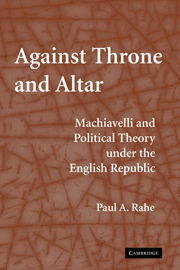Book contents
- Frontmatter
- Contents
- Acknowledgments
- Abbreviations and Brief Titles
- Introduction
- Prologue: Machiavelli in the English Revolution
- PART I MACHIAVELLI'S NEW REPUBLICANISM
- PART II REVOLUTIONARY ARISTOTELIANISM
- PART III MACHIAVELLIAN REPUBLICANISM ANGLICIZED
- PART IV THOMAS HOBBES AND THE NEW REPUBLICANISM
- Epilogue
- Index
PART IV - THOMAS HOBBES AND THE NEW REPUBLICANISM
Published online by Cambridge University Press: 21 July 2009
- Frontmatter
- Contents
- Acknowledgments
- Abbreviations and Brief Titles
- Introduction
- Prologue: Machiavelli in the English Revolution
- PART I MACHIAVELLI'S NEW REPUBLICANISM
- PART II REVOLUTIONARY ARISTOTELIANISM
- PART III MACHIAVELLIAN REPUBLICANISM ANGLICIZED
- PART IV THOMAS HOBBES AND THE NEW REPUBLICANISM
- Epilogue
- Index
Summary
Preface
On Good Friday in 1588, the year of the Spanish Armada, Thomas Hobbes was born the younger son of an ill-educated, exceedingly bibulous, and imprudently pugnacious curate then living in the village of Westport just outside the town of Malmesbury in the county of Wiltshire. From the obscurity to which his paternity would otherwise have condemned him, he was rescued by a childless and prosperous paternal uncle, who sent him to grammar school in Westport to study Greek and Latin and thence on to the University of Oxford. Later he was promoted to prominence by the noble Cavendish family, which hired the young scholar as a tutor in the summer of 1608, kept him on as a gentleman servitor after his charge came of age, and introduced him to many of England's leading lights. As Hobbes demonstrated when he translated Thucydides in his prime and Homer's Iliad and Odyssey in extreme old age, few Englishmen were as thoroughly steeped in the classics. More to the point, few had a better opportunity to drink in the new principles first broached in the sixteenth and early seventeenth centuries, and few were as eager to do so.
When, as a young scholar, Hobbes abandoned Oxford's Magdalen Hall for Hardwick Hall in Derbyshire, he left the world of the old learning for that of the new, and in the process he exchanged a contemplative posture for one of engagement in the affairs of the time.
- Type
- Chapter
- Information
- Against Throne and AltarMachiavelli and Political Theory Under the English Republic, pp. 245 - 248Publisher: Cambridge University PressPrint publication year: 2008



